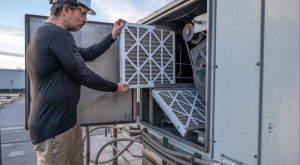Table of Contents
In commercial refrigeration, even the smallest fault can snowball into a costly crisis. Whether storing pharmaceuticals, fresh produce, or perishable goods, the integrity of the cold chain depends on precise temperature control, continuous operation, and responsive maintenance.
The reality? A loose seal, a blocked drain, or a slow refrigerant leak might not raise alarms… until they do.
Temperature fluctuations, compressor strain, and inconsistent cooling can quickly compromise stock, disrupt operations, and damage a company’s bottom line.
That’s why proactive maintenance and fast-response commercial cooler repair are so critical to the long-term health of any refrigeration system.
It’s not just about fixing faults. It’s about preventing the chain from breaking in the first place.
Why the Cold Chain Can’t Afford Downtime?

In cold chain environments, the margin for error is razor-thin. A temperature deviation of just a few degrees can compromise food safety, product quality, or regulatory compliance, and the effects are often irreversible.
From pharmaceuticals and medical supplies to meat, dairy, and fresh produce, temperature integrity is non-negotiable.
Downtime in refrigeration systems can lead to spoilage, halted operations, or reputational damage, depending on the industry.
And because cold chains are time-sensitive and volume-driven, even short disruptions can result in significant financial losses and missed delivery windows.
That’s why businesses across logistics, hospitality, and manufacturing sectors invest in robust refrigeration systems and responsive maintenance frameworks.
Avoiding breakdowns isn’t just about saving on repair costs, it’s about protecting critical inventory, maintaining business continuity, and meeting customer expectations in highly competitive sectors where reliability is everything.
Minor Faults That Lead to Major Refrigeration Failures
Most catastrophic refrigeration failures don’t begin with a loud bang. They start with small, unnoticed faults.
Worn door seals, for example, let in warm air gradually, forcing compressors to overwork and destabilising internal temperatures. Over time, this can reduce system efficiency and lead to component burnout.
Blocked condensate drains, damaged sensors, or misaligned fans can also disrupt airflow and cooling performance, often without triggering alarms.
What seems like a minor dip in efficiency might, in reality, be the early stage of a system-wide issue. Left unchecked, these faults can escalate, impacting stock quality and increasing energy consumption.
Routine system checks are the only way to catch these issues before they spiral. Identifying refrigerant pressure imbalances, insulation failures, or unusual compressor cycles early allows for minor fixes that prevent major loss. In high-demand environments, small oversights are the cracks that break the cold chain.
The Role of Routine Maintenance in Preventing Stock Loss
Routine servicing is one of the most effective ways to protect refrigerated stock and avoid costly disruptions. When done consistently, it keeps systems efficient and flags issues before they become serious.
Identifying Early Warning Signs
Refrigeration systems rarely fail without symptoms. Fluctuating temperatures, short cycling, or excess condensation often signal deeper issues.
Regular checks help spot these early, before they affect cooling performance or stock integrity.
Maintaining Compliance and Consistency
In sectors where temperature compliance is tied to safety standards and audit readiness, consistency is non-negotiable.
Maintenance ensures sensors are calibrated, systems are within spec, and performance is logged, keeping your operation inspection-ready at all times.
Preserving Stock, Reducing Waste
Product loss due to undetected faults can be avoided with basic preventive actions. Routine tasks like cleaning coils, checking airflow, and testing control systems make a tangible difference to the bottom line, helping businesses keep losses low and quality high.
How Fast Commercial Cooler Repair Keeps Operations Moving?

When a cooling system falters, response time is everything. In temperature-sensitive environments, even a few hours of downtime can mean wasted stock, disrupted schedules, and costly cleanup. That’s why access to fast, expert support is a business-critical service.
Technicians trained in commercial cooler repair don’t just restore function; they also diagnose underlying issues, recommend fixes, and help prevent repeat failures.
Quick intervention also minimises the knock-on effects, such as compromised air distribution, overloading backup systems, or equipment damage.
Unplanned breakdowns are often unpredictable, but service response doesn’t have to be. Working with a provider that offers priority repair services and detailed system knowledge gives businesses a crucial edge.
With the right support, operational disruption is brief, controlled, and resolved before it causes wider impact.
In commercial environments, speed and expertise in cooler repair make the difference between a hiccup and a full-scale shutdown.
Small Fixes, Big Impact
Cold chains don’t fail all at once—they fail in stages. A misaligned fan here, a clogged drain there. It’s the small, manageable issues that quietly erode system performance and edge operations closer to loss.
The smart businesses? They don’t wait. They act early, with maintenance routines that prioritise prevention and response partners who know the difference between a quick fix and a lasting solution. Because in refrigeration, attention to detail isn’t optional—it’s a competitive advantage.


